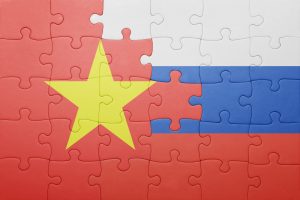The U.S. government has criticized Vietnam’s decision to host Russia’s President Vladimir Putin this week, just days after the conclusion of the Ukraine peace summit in Switzerland.
In a statement provided to Reuters news agency, a spokesperson for the U.S. embassy in Hanoi said that “no country should give Putin a platform to promote his war of aggression and otherwise allow him to normalize his atrocities.”
“If he is able to travel freely,” the spokesperson added, “it could normalize Russia’s blatant violations of international law,” namely, its invasion of Ukraine in February 2022.
Reports began to circulate late last week that Putin would travel to Vietnam on June 19-20 for his first visit since 2017, which was yesterday confirmed by both governments. In its coverage, Reuters quoted unnamed Vietnamese officials as saying that the Russian leader will meet senior leaders including Vietnam’s new president, To Lam, during his visit. It reported that Putin “is expected to announce agreements in sectors including trade, investment, technology and education,” but that talks are also “likely to focus on more sensitive issues,” including arms, energy, and bilateral ruble-dong currency transactions.
The state visit, which will be Putin’s fifth, comes at a time of sharp international focus on the Russia-Ukraine war, following the conclusion of the Summit on Peace in Ukraine in the Swiss town of Bürgenstock. Vietnam, like most of its Southeast Asian neighbors, did not attend the summit, which concluded with a joint peace communique laying out a “common vision” on “crucial aspects” of the conflict, including Ukrainian agricultural exports and the return of Ukrainian prisoners and abducted children.
The U.S. statement reflects Washington’s attempts to isolate Russia and turn Putin into a global pariah, but it was probably never intended to make Vietnam desist from hosting the state visit, or maintaining stable and productive relations with Russia. Despite Putin’s aggression in Ukraine, Russia is among Vietnam’s leading arms suppliers and has deep historical and political connections to the country and the ruling Communist Party of Vietnam (CPV), many of whose senior leadership studied in the Soviet Union.
However, while it is true that a residue of Cold War comity still binds Russia-Vietnam relations, Hanoi’s decision to host Putin can best be explained by the logic of its omnidirectional foreign policy doctrine, which seeks fruitful relations with as many significant powers as possible. Accordingly, the country has hosted the leaders of five of its seven comprehensive strategic partners over the past two years, including U.S. President Joe Biden and Chinese leader Xi Jinping within three months of each other. Putin will be the sixth, leaving just Indian Prime Minister Narendra Modi.
While there was reportedly some hesitancy on the part of the Vietnamese government about whether to host Putin this month, the visit is Vietnam’s way of signaling that it has no intention of taking sides between the great powers. This is also the likely reason why Vietnam has taken a neutral position on the Russia-Ukraine war, refused to condemn Putin’s invasion, and declined to attend last weekend’s peace summit, to which Russia was not invited.
Putin’s red carpet treatment also points to the limits to the historic upgrade in U.S.-Vietnam relations that took place during Biden’s visit last year. While the U.S. is and will remain a valuable partner of the Vietnamese government, from Hanoi’s perspective it remains diplomatically co-equal with its rivals, including China and Russia. For all its worries, there is little chance that Vietnam can be successfully drawn into a U.S.-led coalition designed to counter the two rival powers.

































